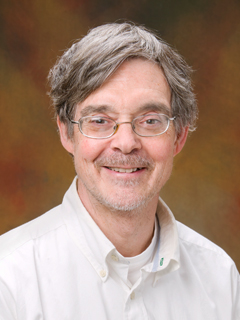HOW CAN WE HELP YOU? Call 1-800-TRY-CHOP
In This Section

Dr. Worthen's research program focuses on the mechanisms of acute inflammation in the lung. For more than 30 years he has worked to develop concepts, tools, and approaches to understand how neutrophils are mobilized from the bone marrow, retained within pulmonary capillaries, and migrate into the lung parenchyma and airspaces.
Bio
Dr. Worthen's research focuses on the mechanisms by which polymorphonuclear leukocytes (neutrophils) are attracted to, and potentially injure, the lung. Following an inflammatory response in the lung, neutrophils are further recruited from the bone marrow into the circulation, and thence are avidly retained within the lung. He is interested in mechanisms of recruitment during inflammation, as well as the feedback loops that control neutrophil number under both homeostatic and inflammatory conditions.
Neutrophil number in the circulation is regulated in a complex fashion that senses neutrophil accumulation at a sentinel site, which Dr. Worthen believes is the gut. Chemokine CXCL5 secretion by the gut epithelium attracts neutrophils, which are then sensed by phagocytic cells that secrete a variety of cytokines. Recognition of neutrophils is accompanied by decreased secretion of IL-l and IL-23, cytokines that drive differentiation of IL-17-producing cells. IL-17 in turn induces production of G-CSF and other CXC chemokines, thus contributing to release of neutrophils from the bone marrow. Somewhat surprisingly, the gut microbiome is involved in establishing the "setpoint" for these cytokines, and hence the neutrophil number. This complex feedback system is deranged in mice deficient in CXCL5, or the receptor for CXC chemokines, CXCR2. It is also abnormal in mice and humans deficient in CD18.
Within Neonatology, Dr. Worthen and his colleagues are particularly interested in the period during which the neonate acquires its repertoire of microbes in the gut and other sites. In addition, he is interested in the idea that this process sets in motion this feedback mechanism, and thus may be critically important for the adaptation of neonates to a world containing microbes.
Education and Training
AB, Harvard College (History and Science), 1973
MD, Harvard Medical School, 1977
Titles and Academic Titles
Attending Physician
Professor of Pediatrics
Professional Memberships
American Heart Association Clinician-Scientist, 1983-
Founding member, Lung Biology and Pathology Study Section, 1991
American Society for Clinical Investigation, 1994-
Society for Pediatric Research, 2010-
Professional Awards
Max and Sara Cowan Endowment Fellowship, National Jewish Center for Immunology and Respiratory Medicine (NJCIRM), 1982-1983